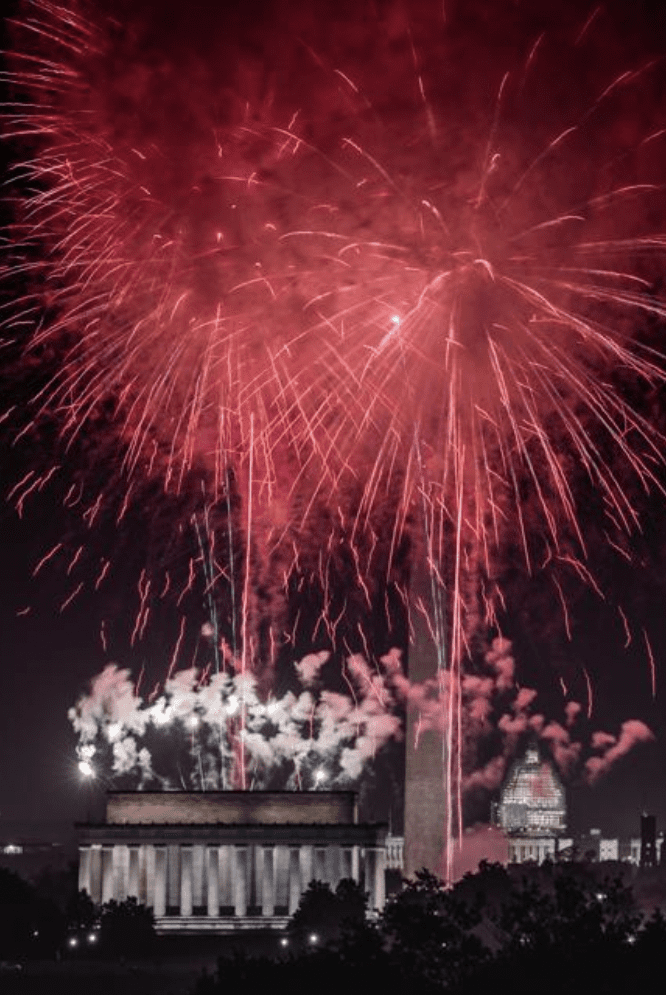Why We Celebrate the Fourth of July
By • July 1, 2021 0 1177

The Fourth of July serves as the quintessential day to celebrate the nation’s birthday. It was on this day in 1776 — after over a year of fighting the British Redcoats — that the Continental Congress in Philadelphia published its Declaration of Independence for the whole “candid world.” The resolution announced boldly that “these United Colonies are, and of Right ought to be Free and Independent States; that they are Absolved from all Allegiance to the British Crown, and that all political connection between them and the State of Great Britain, is and ought to be totally dissolved.” Until this moment, most members of the Continental Congress had leaned towards remaining a part of the British empire.
The majority of Americans in the colonies, however, were fed up with the British entrenched class system pitting nobles against “commoners” (as the British often reminded the Americans) and elevating “royal blooded” monarchs who ruled by the “divine right of kings.” The whole system defied the “Common Sense” Americans had learned from Thomas Paine’s revolutionary pamphlets. It was time to throw off a degrading tyranny and fight for true self-government.
For the 13 colonies — many with substantial Loyalist populations — a unanimous resolution to declare American independence was never a safe or easy proposition. Several newly declared states would suffer devastating British naval blockading, destructive occupations and battles that would last throughout the eight exhausting years of the American Revolution, from 1775 – 1783.
Drafted primarily by Thomas Jefferson of Virginia, the Declaration has served as the touchstone of American liberties and values ever since its publication. Its first paragraph — grounded in the 18th century Enlightenment values of science, reason and progress — serves as a concise summary of the American ethos.
Since the publication of the Declaration, national liberation movements around the world have sited the document’s espousal of such “natural rights” as the right of “the people” to overthrow tyrannical government. Under social contract theory, governments were now obligated to protect people’s natural-born rights, rather than simply to wield arbitrary powers.
Even Jefferson’s own personal failures to live up to the American creed are measured against the Declaration’s “self-evident truths” that “all men are created equal” and that “they are endowed by their Creator with certain unalienable Rights,” and that “among these are Life, Liberty and the pursuit of Happiness.” After all, Jefferson held slaves for another 50 years to the day after writing the Declaration.
The founders’ failure to abolish slavery in the new nation or grant immediate voting rights to women, African Americans, Native Americans, and non-landholders have all been rightly criticized as blatant hypocrisies, given the emphasis on the need for the “consent of the governed” Jefferson proclaimed in the opening passages of the Declaration.
Despite many of the founders’ shortcomings, however, the birth of the United States ought still to be celebrated. For the first time in world history, a non-monarchical Republic deriving its powers from written constitutions (at both the state and federal levels) and dedicated to due process under the law was summoned to existence. Since its creation, the nation has fought to support and defend democratic governments around the world. Constitutional rights and protections have since been extended to groups of Americans the founders never would have imagined.
While the United States still has a long way to go to live up to the full ideals of what the Rev. Dr. Martin Luther King, Jr. called the “promissory note” of the Declaration of Independence, the publication of those ideals continues to serve as a guide for the American experiment.

